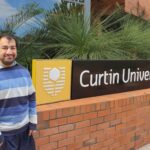Overseas study is often touted as a fantastic way to enhance your degree, make new friends and build life skills, but what’s it actually like? Curtin psychology honours student and assistant course advisor Swati Mangalam recounts her student exchange experience with the University of Essex in England.
When did you go on exchange?
I went in Semester two 2016 to the University of Essex in England, which is about an hour north-east of London by train.
I was on exchange for five-and-a-half months.
What gave you the confidence to pack up and leave for a different country?
I wanted to go because even though I was born in Perth, I attended an international school in Brunei for 11 years. The school had a British curriculum, so I grew up with British teachers and learning about British history, but I had never been to Britain.
I started by looking at Curtin’s partner universities in my spare time and the units they had to offer. It peaked my interest and I became more and more invested. What’s the phrase? It snowballed! I just had to make it happen. A year later I was booking my flights.
How easy was it to make new friends?
That was probably the thing I was most nervous about. I had a lot of friends who went on exchange before who said, ‘it just happens naturally’, but I had never believed them.
When I got there, the University of Essex was great in that they put all of the exchange students together in the same accommodation. I was with students who were in the exact same position as me and who had the same idea of their time as me: they wanted to travel and put themselves out there. We had the same goals and we all just clicked. And, because they were my flatmates, we spent every hour of every day together so we became great friends.

How easily did the units match up?
Very easily. I found that a lot of British universities had a course structure in psychology that was similar to Curtin’s. But there was one unit that I had to do at Curtin because I couldn’t find anywhere to study it abroad. I ended up studying that unit online and picking up four units at Essex, so I was studying five units.
How did studying at the University of Essex compare to Curtin?
It’s really different in terms of course delivery. There’s a lot of independent study at Curtin, but it’s even more independent over there.
I was also really lucky because one of the units I had to study was a cross-cultural unit, so I was able to study that with a focus on the UK, which was interesting.

What’s some of the unique, exciting things you were able to experience?
I travelled… a lot. It was my first time in Europe and there were so many things I wanted to do.
Before I travelled to the University of Essex, I went to France for a month and I learned French.
While I was studying, I also travelled with my flatmates to seven other countries. Every other weekend we went overseas, and that was actually very easy to do because it was very cheap. I got tickets to and from Ireland for £9, which is about $15. Basically, I now pay more for a meal in Perth than I did for a flight there.
I travelled north and south in Britain as well. Life was pretty good.
What stands out to you?
Ireland! I always say this because Ireland is a place that not a lot of people think to go to when they visit Europe because it’s not on the mainland or as close to it as Britain. But I went to Ireland and it blew my mind.
It was probably the most gorgeous country that I visited and I think the Irish are the best people. I spent a day in Dublin and I spent a day on the west coast. The scenery was really, really gorgeous. I couldn’t get enough of Ireland. I was so unhappy leaving it.

I applied for the OS-HELP loan. It’s a $6,500 loan, which they add on to your HECS debt, so you don’t have to pay it back until you’re earning money, just like you don’t have to pay your HECS back until you’re earning above a threshold. It just adds to that debt.
I also applied for the Curtin mobility scholarship, which I ended up getting. That was a $2,000 scholarship. It paid for my flights in full!
So those two, combined with a year of savings, meant I didn’t struggle at all. I was able to do whatever I wanted. I actually wasted a bit of money as well. I bought some plane tickets and didn’t go, but it was $15, right?
How do you think studying abroad has added to your degree?
It’s given me the experience and skills to deal with people from all walks of life and from all cultures.
I also had to deal with some pretty irritating people and I think it built up my tolerance. I’m learning as I go that people are just different and they’re going to clash with you, sometimes.
The biggest things I learned were how to deal with people like that and how to get past it. I think those skills will come in very handy with my career.
I’m also aiming on going into a master degree next year. It’s a very competitive course, so I think being on that amazing experience will put me ahead of the pack in terms of applying.

Why do you think other students should go on exchange?
It is a life-changing journey. I went into it as one person and came out a much better person.
By experiencing different cultures and lifestyles, you start to appreciate what you have. You get a sense of ambition, you know what you want and you make incredible friends from all over the world. I’m still in touch with most of my friends from exchange and now I have places to stay when I go visit them.
You also learn a lot of “street smarts” and problem-solving skills. I struggled with language barriers and settling in in general. People weren’t always the nicest, but I figured out what I needed to do on my own and in the end, it became an adventure. I wouldn’t have experienced that in Perth because there’s no language barrier and I’m familiar with everything.
Put yourself out of your comfort zone. Put yourself somewhere you’re unfamiliar with and you’ll learn a lot.



